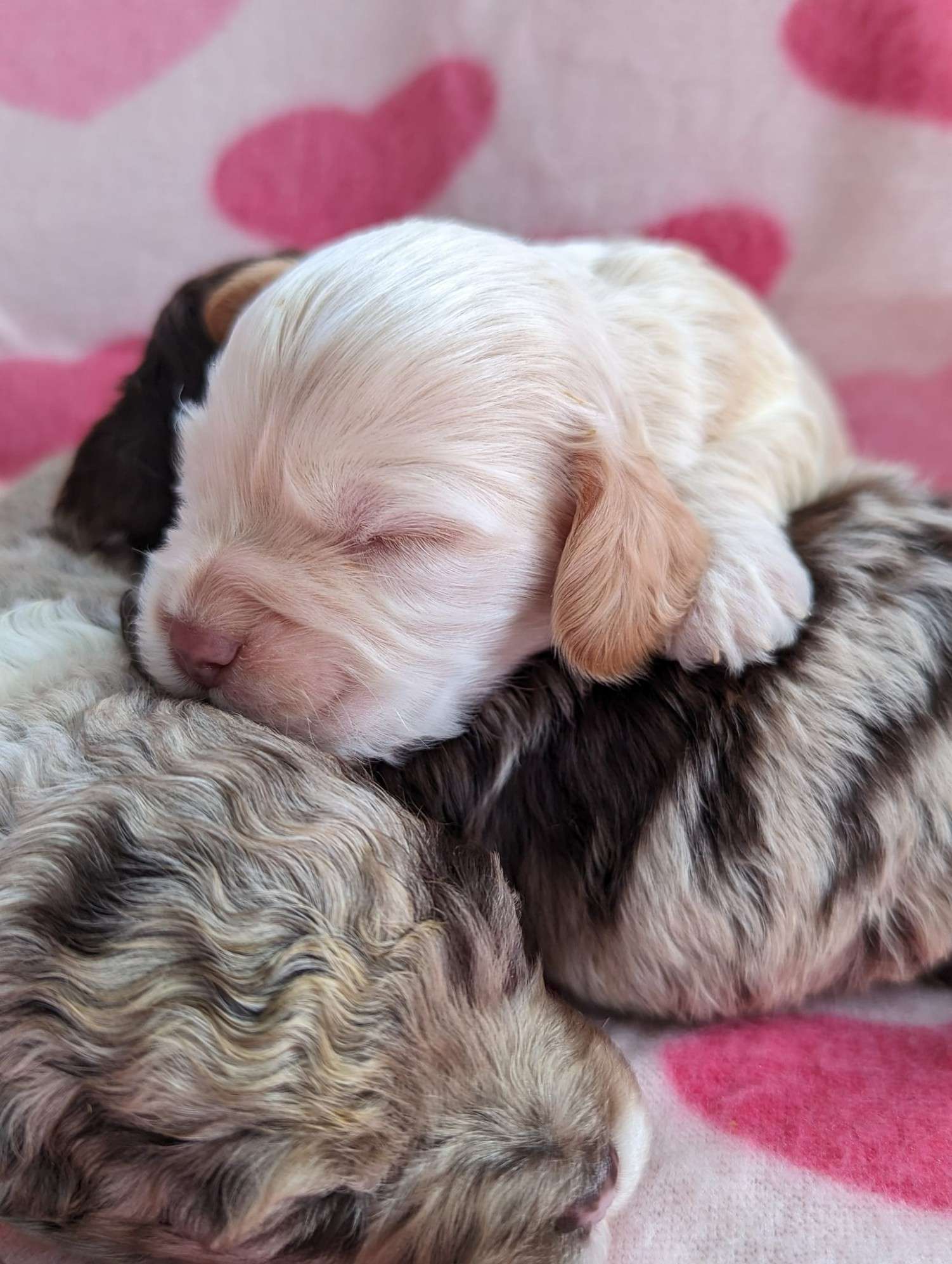How I raise my puppies
Most people don't know that the gestation period of dogs is 9 weeks. When I have an expecting mom, she is given extra special care and attention. Preparations for her litter begin long before the anticipated arrival date. She is my top priority. To begin with, I keep a close watch on momma and try my best to predict when labor is starting. I like to be present for the birth and assist with delivery. My girls are chosen for relaxed and cooperative temperament and they all know and trust me with the handling of her puppies. I help her clean and dry each pup and return it to her as quickly as possible. I also have an emergency warming box ready if needed to place the puppies in while mom is busy delivering the next pup. This gives me a chance to take a quick look at structure, markings, and sex of the pups and makes sure they are breathing (crying is good) well on their own. If they need a little help, my years of experience come on real handy.
Once I think mom is done with delivery, I allow her an hour or two to rest, then coax her outside for a quick break so I can change bedding and do another assessment on the pups. Then I leave her alone to rest and bond with her babies, making sure all are warm, dry and nursing well. Moms of new litters will be unwilling to leave for more than a minute or two the first week after delivery.
The first two weeks of puppy’s life, they are quite helpless. They will sleep when warm and comfortable, and are stimulated to seek mom and nurse whenever disturbed. Have you ever watched a newborn puppy sleep? They will often twitch their little bodies while sleeping. This is a sign of a health and growing puppy. Nature is doing its job to develop nerves and muscle. I do daily neurological stimulation exercises with the litter each day. This stimulates the immune system, reflexes and cognitive development of the puppy. Puppies are assessed daily and monitored to be sure they are gaining weight and feeding well. Border Collies are excellent natural moms and rarely need any assistance. She will do her job of keeping them clean, well-tended, and warm.
At two weeks of age there is a huge change. The puppies open their eyes, start to hear, and begin to interact. The tails begin to wag and they can stand, although wobbly, and take a few steps. I continue to handle and asses the pups daily. I pick them up and hold them close so they can smell me, hear my heartbeat, and know they are safe.
Weeks 3-5 are rapid growth and development stages. They learn to be more coordinated, play with each other, and become more and more aware of their surroundings outside of the whelping box. They will begin to leave the nest to explore, try to eat mom’s food and seek a place to ‘do their businesses away from the sleeping area. Through this stage I am exposing them daily to new objects in their pen as well as noises. By 3-4 weeks I will change the whelping box into a litter box and fill with first puppy pads, and as they grow, sawdust. They quickly take to going in the sawdust area which is much less messy and the first step in house training. I keep a small crate with no door in their pen which they like to pile up in for naps. This introduces them to crates and crate training without trauma.
At 6 weeks the pups will be eating solid food and begin weaning from mom. They will get their first vaccination and go outside to eat if the weather is nice. I like to take the pups on walks on our property and by 7 to 8 weeks they are ready to hit our trials in the woods. This kind of experience introduces something new each day. Many breeders prefer to keep their pups indoors and create an artificial environment. But I feel the real world exposure is much more beneficial. They will navigate different types of terrain, from grass to gravel, dirt to water. They explore new sights, sounds and smells. They learn to pay attention so they don’t get ‘lost’. I work on recall and give them treats for checking in with me. They get the chance to romp with older dogs too. Some love puppies and will lay right down with them and let them crawl all over, while others are not so tolerant and give them a spank for being too nosey. Puppies learn quickly to read the adults and mind their manners.
At 8 weeks, the puppies are ready to start their new adventure as your pet. They have the basic idea of where they should go potty, so if you are consistent and pay close attention to his signals, he will catch on quick. He will be eating solid food and go home with a few days sample to get started. He will be weaned from mom, but if you’d like, we can rub a towel or toy over mom and siblings to make a scent/comfort item for his new home. He will be ready to explore his new environment and learn what is and isn’t allowed. And he will be ready to start on basic obedience from the day you take him home.
